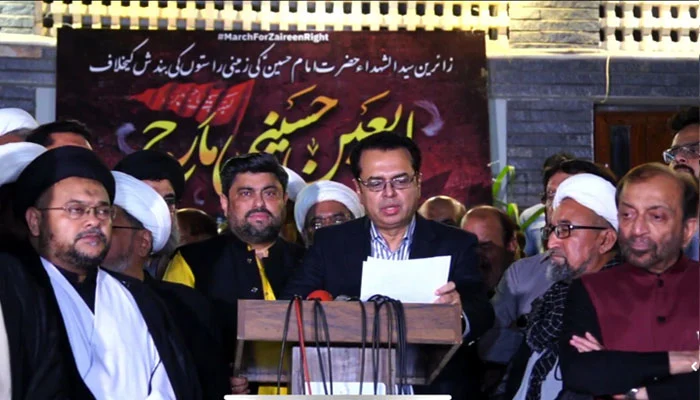The Majlis Wahdat-e-Muslimeen (MWM) and the Shia Ulema Council have called off their planned protest march from Karachi to the Pakistan-Iran border following successful negotiations with the federal government. The decision came after late-night talks involving Sindh Governor Kamran Tessori, State Minister for Interior Talal Chaudhry, and MWM leader Allama Raja Nasir Abbas Jafri. A seven-point agreement was finalized, addressing key concerns of pilgrims affected by the government’s ban on land travel for this year’s Arbaeen pilgrimage.
Under the agreement, the government pledged to facilitate 60-day visa extensions in coordination with Iraqi authorities and arrange discounted flights for pilgrims. Additionally, those who had already paid for overland travel will receive refunds from tour operators and transport services. While the Taftan-Rimdan border remains open, authorities strongly advised against road travel due to security threats. State Minister Talal Chaudhry thanked MWM leaders for their cooperation, ensuring pilgrims’ concerns were addressed.
MWM Vice Chairman Allama Ahmed Iqbal Rizvi expressed gratitude to the government for resolving the issue and acknowledged Governor Tessori’s role as a mediator. He confirmed the protest march’s cancellation but emphasized that the MWM would monitor the implementation of the agreement. The governor assured that all stakeholders had agreed to dialogue over protests, fostering a peaceful resolution.
Earlier, Interior Minister Mohsin Naqvi had banned road travel for Arbaeen pilgrims, citing security risks. Every year, around 700,000 Pakistani pilgrims travel to Iraq for Arbaeen, commemorating the martyrdom of Hazrat Imam Hussain (RA). The government’s restrictions had sparked protests, but the latest agreement has averted a potential crisis, ensuring pilgrims’ rights while maintaining security measures.


